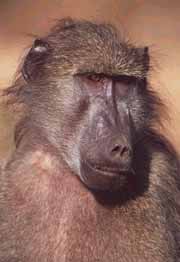|
Pig's blood
as a cure may sound mediaeval. But seeding animals with pig blood
cells is one strategy for success in pig-to-primate organ transplants.
And the complications created may throw light on a common hitch
in human-to-human bone-marrow transplants.
 Xenotransplantation,
such as the transfer of pig organs to humans, holds hope of relieving
current shortage of transplant organs. But it triggers an immediate
and massive immune-rejection response. Xenotransplantation,
such as the transfer of pig organs to humans, holds hope of relieving
current shortage of transplant organs. But it triggers an immediate
and massive immune-rejection response.
Transplants
of the donor's bone-marrow stem cells, which generate blood cells,
may prepare the body to tolerate a subsequent organ transplant.
Bone marrow produces the white blood cells that attack foreign tissue.
Researchers hope that the transplanted cells will replace those
that normally recognize and reject donor tissue. The aim is to create
a persistent mix of host and donor bone-marrow cells.
"We're trying
to [induce] long-term tolerance to the graft," explains Robert Sackstein
of Harvard Medical School in Boston, Massachusetts. Testing pig-to-baboon
bone-marrow transplants, he and his team reasoned that flooding
baboons with pig stem cells should encourage the grafts to settle.
As they increased
the number of pig cells, they hit a complication: they detected
damage to the baboon's red blood cells caused by blood clots in
the lining of their blood vessels1.
"It put a wrench in our gears," he says.
But the setback
may have a useful spin-off. The team believe that they have stumbled
on an animal model for studying a human condition - thrombotic microangiopathy
- in which the clots in blood-vessel linings snag and rip passing
red blood cells.
"It's like putting
a piece of cheese through a cheese wire," explains Anthony Warrens,
who works on xenotransplantation at Hammersmith Hospital in London.
The condition, which affects up to 14% of human bone-marrow transplant
patients, can cause brain damage, renal failure and even death.
The body fights
grafts, but grafts fight back, explains Thomas Starzl, a transplantation
pioneer at the University of Pittsburgh, Pennsylvania. The blood
clotting that Sackstein found may be a symptom of graft-versus-host
disease (GVHD), in which transplanted cells attack their new body.
Bone-marrow
transplants are used to treat certain cancers such as leukaemia
and lymphomas, replacing cancerous blood cells after chemotherapy.
The likelihood of developing GVHD depends on how well-matched donor
and host tissues are.
Cross purposes
This research
also highlights the kind of hurdles still faced by xenotransplantation.
Using bone marrow to get donors to accept grafts is one way to overcome
the mutual rejection reaction. "A lot of people are very enthusiastic,"
says Warrens.
"Sackstein's
group deserves a lot of respect for tackling this tough problem,"
admits Starzl. Like other primates, our reaction to pig tissue is
particularly severe: we carry antibodies directed against a molecule
on the surface of pig cells. This innate immune response is "merciless,"
says Starzl, and can destroy alien organs in less than a day.
Starzl's team
takes an alternative approach. They are genetically modifying pigs
to remove the offending gene. "We're trying to 'humanize' the graft,"
he says.
|
References
- Buhler,
L. et al. Porcine hematopoietic cell xenotransplantation
in nonhuman primates is complicated by thrombotic microangiopathy.
Bone Marrow Transplantation,
27, 1227 - 1236, (2001).
|
|
© Nature News Service / Macmillan Magazines Ltd 2001
|
|